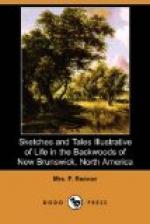I remember once coming from St. John’s by water. The frost set in rather earlier than we expected. The farther from the sea the sooner it commences; so as we proceeded up the river our boat was stopped by the crystal barrier across the stream, not strong enough yet to admit of teaming, and we had nothing for it but a walk of seven miles through the forest,—home we must proceed, though evening was closing in and darkness would soon be around us, the heavy atmosphere told of a coming storm, and ere to-morrow our path would be blocked up. America is the land of invention; and here we were, on the dreary shore, in the dusky twilight—a situation which requires the aid of philosophy. We were something in the predicament of the Russian sailors in Spitzbergen, we wanted light to guide us on the “blaze,” without which we could not keep it; but beyond the gleam of a patent congreve, our means extended not. One of our company, however, a native of the country, took the matter easy. Some birch trees were growing near, from which he stripped a portion of the silvery bark, which being rolled into torches, were ignited; each carried a store, and by their brilliant light we set out on our pilgrimage. The effect of our most original Bude on the snow-wreathed forest was magical—we seemed to traverse the palace gardens of enchantment, so strange yet splendid was the scene—the snow shining pure in the distance, and the thousand ice gems gleaming ruby red in the rays of our torches. They are wondrous to walk through, those boundless forests, when one thinks that by a slight deviation from the track the path would be lost; and, ere it could be found again, the spirit grow weary in its wanderings, and, taking its flight, leave the unshrouded brows to bleach on summer flowers or winter snows, in the path where the graceful carraboo bounds past, or the bear comes guided by the tainted breeze to where it lies.
It was on this midnight ramble that the facts of the following lines were related to me, ending not, as such tales generally do, in death, but in what perchance was worse,—civilisation lost in barbarism.
Many years ago two children, daughters of a person residing in this province, were lost in the woods. What had been their fate none knew —no trace of them could be found until, after a long period of time had elapsed, one of them was discovered among some Indians, by whom they had been taken, and with whom this one had remained, the other having joined another tribe. She appeared an Indian squaw in every respect—her complexion had been stained as dark as theirs—her costume was the same, but she had blue eyes. This excited suspicion, which proved to be correct. The story of the lost children was remembered, which event occurred thirty years before. With some difficulty she was induced to meet her mother, her only remaining parent. The tide of time swept back from the mother’s mind, and she hastened to embrace the child of her memory, but, alas! the change. There existed for her no love in the bosom of the lost one. Her relatives wishing to reclaim her from her savage life, earnestly besought her to remain with them, but their ways were not as her’s—she felt as a stranger with them, and rejoined the Indian band, with whom she still remains.




